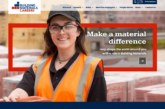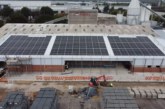
Self-isolation alerts are having a significant impact on the supply of building materials, according to The Builders Merchants Federation.
The organisation has raised concerns with government about the affect staff shortages are placing on an industry already balancing unprecedented demand. John Newcomb, CEO of the BMF, said: “We are currently facing the biggest demand for building products we have seen in more than 30 years. We are already struggling with the labour we have to meet that requirement.
“Now, with many staff going into isolation after being pinged by the NHS Covid app, builders’ merchants, and building materials suppliers and manufacturers, are facing a huge challenge.”
He added: “The past two to four weeks have been described as the most challenging of the entire pandemic by some members. Our concern is that lead times will be pushed even further back and we could see disruption, now and later down the line.
“The supply chain is extremely stretched on all fronts (and) we are feeding all our data back to the government as they establish a complete picture of the situation. Hopefully a solution can be achieved. An ideal situation would be to pull the exemption date forward for the sector.”
The BMF represents 760 members, who together employ over 207,000 people in the building materials industry.
Frank Elkins, Group Chief Operating Officer for Travis Perkins plc, said: “We are disappointed that our colleagues have not been included on the list of workers that can be made exempt from full self-isolation if they are alerted by NHS test and trace. Having worked hard to put in place measures that safeguard our staff while they have played such a vital role in helping to maintain essential services that are so crucial to keeping us all dry, warm, safe and secure, we urge the Government to look again at the broader construction supply chain and its importance to the country at large.”
“The past two to four weeks have been described as the most challenging of the entire pandemic by some members. Our concern is that lead times will be pushed even further back and we could see disruption, now and later down the line.”
Martyn Coffey, Chief Executive Officer, Marshalls plc, commented: “After the challenges in 2020, no one could have accurately predicted the shape of demand in 2021. This demand continues to grow and the effects of Covid, in particular, the ‘self-isolation’ practices are now beginning to bite within the Marshalls business.
“Health and Safety has always been our number one consideration throughout this pandemic. We have gone above and beyond government guidelines to keep our people safe. (But) what we are now seeing is a very high incidence of absence (due mainly to self-isolation through NHS Test and Trace) and this is compromising our ability to operate.
“What is most challenging is the volatile nature and the inability to plan for this random alerting. As we support our colleagues to self-isolate, it is putting increasing pressure on those who are attending work resulting in an increasing concern about the mental health and wellbeing of these individuals who are carrying additional workloads.”
Martyn continued: “If the construction manufacturing sector could be categorised as ‘essential’ it would be a significant help to maintaining production levels. This would mean that colleagues who have been double jabbed could be exempted from self-isolation in the period from now until the rule change (currently planned for 16th August 2021).”
Paul Bence, Managing Director of Cheltenham-based independent builders’ merchant George Bence Group, added: “With it also being staff holiday season, we have been operating on a skeleton staff basis in many areas.
“Currently, 15% of our workforce have been affected by self-isolation this week. None of them have tested positive for Covid-19.”
Related News:
Powered Now CEO discusses impact of ‘pingdemic’ on the building sector









